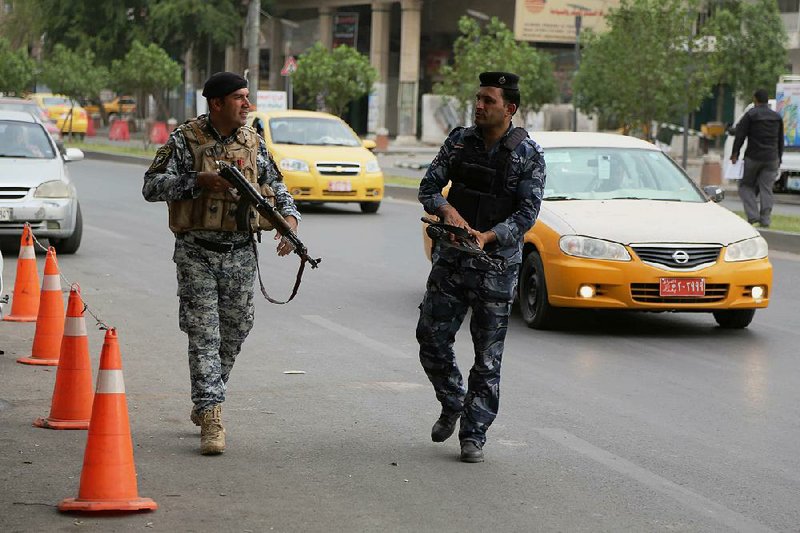BAGHDAD -- Iraqi Prime Minister Nouri al-Maliki moved closer to winning a third term Monday as his Shiite-dominated political bloc emerged firmly in first place in the country's first parliamentary elections since the U.S. military withdrawal in 2011.
Rival Shiite blocs were the next two top vote-getters, with Sunni blocs trailing as the country grows increasingly polarized along sectarian and ethnic lines.
The showing increased the likelihood that Iraq's next government could rely on an even narrower Shiite base than the current one, which Sunnis see as biased against their sect and Kurds deem hostile to their efforts to carve out greater autonomy in the north.
Al-Maliki's State of Law bloc was never expected to secure a majority of 165 seats in the 328-member parliament, and he will need to approach other parties to piece together a broader majority coalition.
Still, the 92 seats his bloc walked away with increase the 63-year-old premier's chances of holding onto the post he first ascended to in 2006.
The parliamentary election was the third since the 2003 U.S.-led invasion that removed dictator Saddam Hussein's Sunni-led regime and put the Shiite majority in power.
A resurgence of sectarian violence in the country, which nearly tore Iraq apart in 2006 and 2007, is being fueled by deep-seated divisions within Iraq and the 3-year-old civil war in neighboring Syria.
Iraq's Sunni minority has felt increasingly marginalized by al-Maliki's government since he cracked down on a protest movement demanding overhauls last year.
Islamic militants, meanwhile, have seized control of the city of Fallujah and other pockets of the Sunni-dominated Anbar province west of Baghdad and carry out frequent and carefully orchestrated mass-casualty attacks in the capital.
"For the Sunnis, the election results were unsatisfactory, and they were below our expectations. I think that the violence in Anbar province has played a role in this electoral disappointment. Many Sunni voters were not able to cast their ballot because of the violence in Anbar," Sunni lawmaker Raad al-Dahlaki said. "The next phase in Iraq will be a difficult one because now we have a lot of people who lost hope in real change."
More than 9,000 candidates from across Iraq battled for seats in the April 30 election. Electoral officials reported that 62 percent of the 22 million eligible voters cast ballots -- the same turnout as in the last parliamentary elections in 2010.
The results released Monday by the Independent High Electoral Commission showed that al-Maliki's State of Law won the top spot in 10 of 18 provinces.
Powerful Shiite cleric Ammar al-Hakim's al-Muwatin bloc came in second with 29 seats, followed by firebrand Shiite cleric Muqtada al-Sadr's main al-Ahrar bloc with 28 seats. Two smaller parties of Sadrist supporters drew a combined six additional seats and will likely team up with al-Ahrar in a broader coalition.
Sunni parliament Speaker Osama al-Nujaifi's Mutahidoun ended up with 23 seats. The al-Wataniya list, a Sunni-backed bloc led by the secular Shiite former Prime Minister Ayad Allawi, won 21 seats. Sunni Deputy Prime Minister Saleh al-Mutlaq's al-Arabiya list gained 10 seats.
The two main Kurdish parties, the Patriotic Union of Kurdistan and the Kurdish Democratic Party, each took 19 seats, while the Kurdish reformist Goran Party won nine.
The American Embassy in Baghdad commended the Electoral Commission, candidates, security forces and voters in the electoral process.
"As the process moves towards government formation, we encourage all political entities to conduct talks in a spirit of cooperation and respect for the will of the voters," the embassy said.
Negotiations to choose a new government will likely drag on for weeks, if not months.
It took political rivals nine months to form the last government in 2010. Even then, lawmakers failed for years to agree on the candidates for the powerful ministers of defense and interior, and al-Maliki is still acting interior minister.
Under Iraq's constitution, the president must ask the new parliament to convene 15 days after results are ratified.
Further violence struck as results were being released, with two separate bomb attacks in Baghdad killing four people, according to police and hospital officials. They spoke on condition of anonymity because they weren't authorized to release the information to journalists.
Information for this article was contributed by Adam Schreck of The Associated Press.
A Section on 05/20/2014
